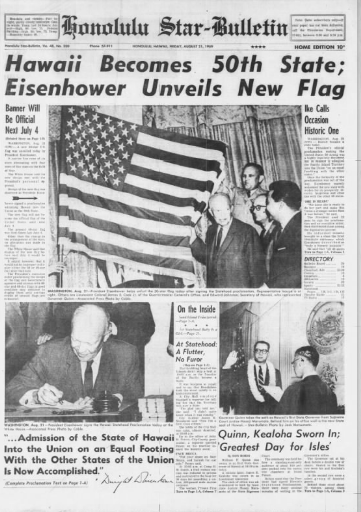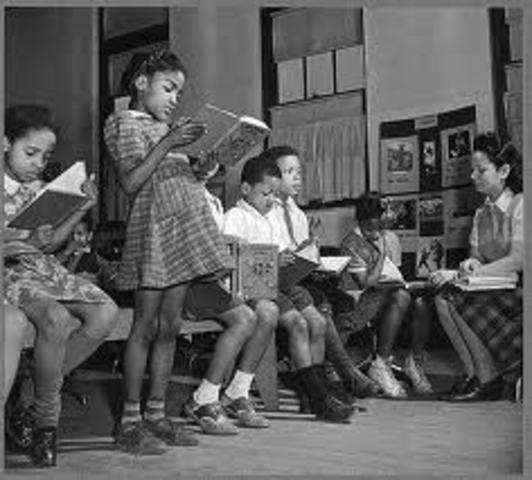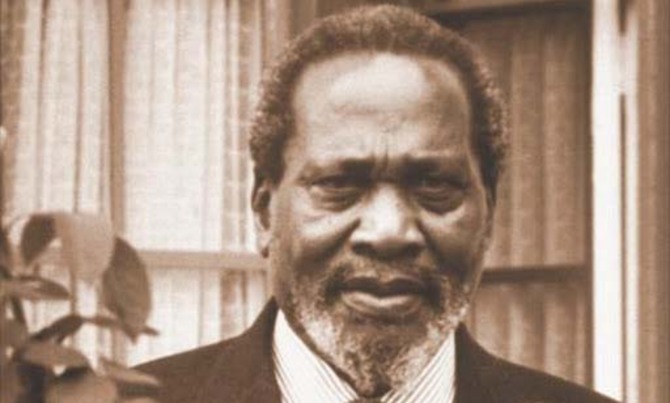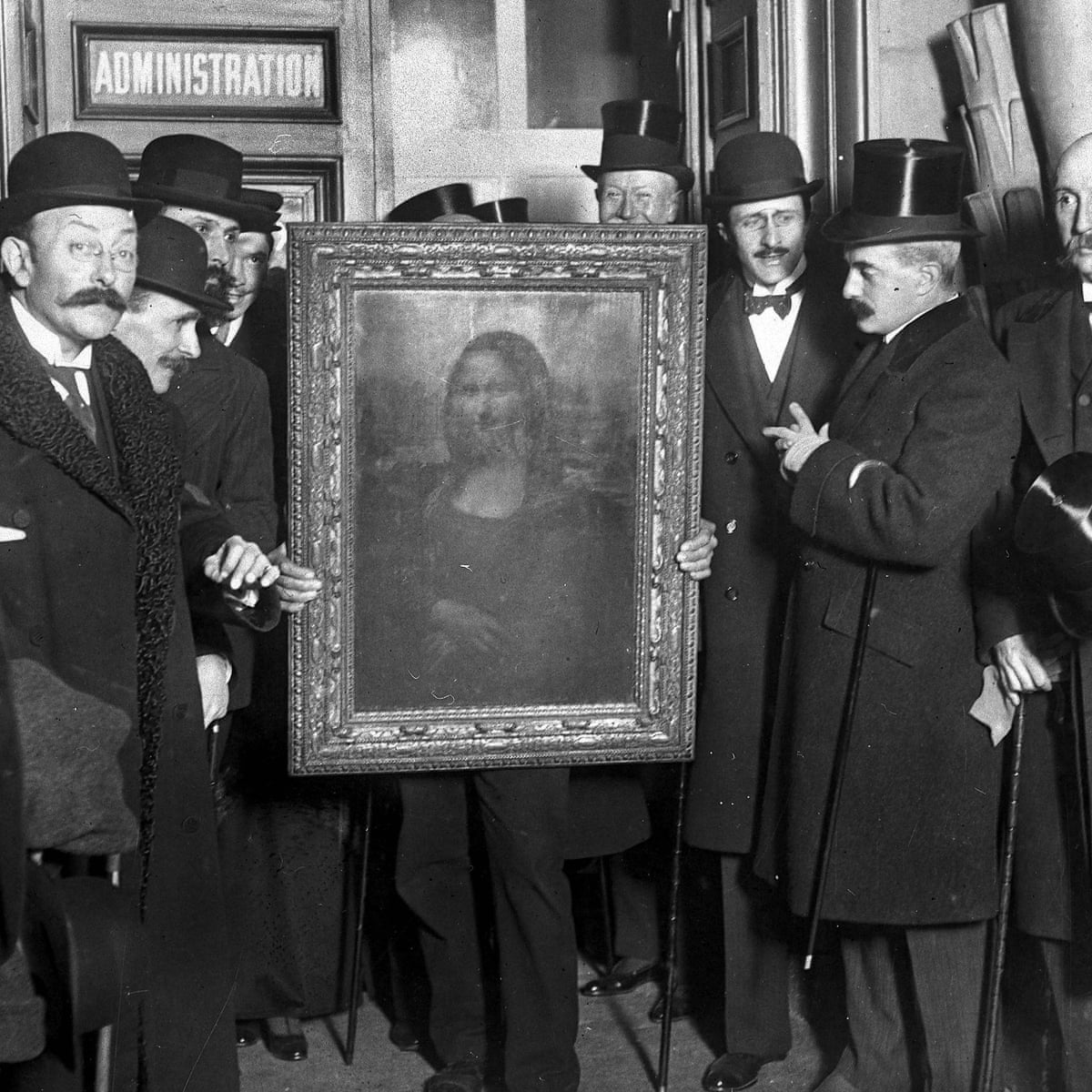
Hawaii becomes 50th state
The modern United States receives its crowning star when President Dwight D. Eisenhower signs a proclamation admitting Hawaii into the Union as the 50th state. The president also issued an order for an American flag featuring 50 stars arranged in staggered rows: five six-star rows and four five-star rows. The new flag became official July 4, 1960.
The first known settlers of the Hawaiian Islands were Polynesian voyagers who arrived sometime in the eighth century. In the early 18th century, American traders came to Hawaii to exploit the islands’ sandalwood, which was much valued in China at the time. In the 1830s, the sugar industry was introduced to Hawaii and by the mid 19th century had become well established. American missionaries and planters brought about great changes in Hawaiian political, cultural, economic, and religious life. In 1840, a constitutional monarchy was established, stripping the Hawaiian monarch of much of his authority.
In 1893, a group of American expatriates and sugar planters supported by a division of U.S. Marines deposed Queen Liliuokalani, the last reigning monarch of Hawaii. One year later, the Republic of Hawaii was established as a U.S. protectorate with Hawaiian-born Sanford B. Dole as president. Many in Congress opposed the formal annexation of Hawaii, and it was not until 1898, following the use of the naval base at Pearl Harbor during the Spanish-American War, that Hawaii’s strategic importance became evident and formal annexation was approved. Two years later, Hawaii was organized into a formal U.S. territory. During World War II, Hawaii became firmly ensconced in the American national identity following the surprise Japanese attack on Pearl Harbor in December 1941.
1980
People for the Ethical Treatment of Animals (PETA) is founded
On August 21, 1980, animal rights advocates Ingrid Newkirk and Alex Pacheco found People for the Ethical Treatment of Animals. Rising from humble beginnings, PETA will soon become the world’s foremost and most controversial animal rights organization.

US GOVERNMENT
1974
The Equal Educational Opportunities Act takes effect
The Equal Educational Opportunities Act takes effect on August 21, 1974. The new law addressed civil rights issues in education, barring states from discriminating against students based on gender, race, color, or nationality and requiring public schools to provide for students.
/banastre-tarleton-large-56a61b763df78cf7728b5fd1.jpg)
AMERICAN REVOLUTION
1754
Bloody Ban Tarleton born in Britain
On August 21, 1754, Banastre Tarleton is born as the fourth child of John Tarleton, the former lord mayor of Liverpool, and a money lender, merchant and slave trader. After completing his education at Oxford, Tarleton became the most feared officer in the British army during the War for American Independence, memorialized in portraits by Sir Joshua Reynolds and Thomas Gainsborough, as well as on film in The Patriot (2000), starring Mel Gibson, as the basis for the character Colonel William Tavington.

AFRICA
1961
Jomo Kenyatta, Kenyan independence leader, is freed from prison
Jomo Kenyatta, leader of the Kenyan independence movement, is released by British colonial authorities after nearly nine years of imprisonment and detention. Two years later, Kenya achieved independence and Kenyatta became prime minister.

SLAVERY
1831
Nat Turner launches massive insurrection in Virginia
Believing himself chosen by God to lead his people out of slavery, Nat Turner launches a bloody insurrection in Southampton County, Virginia. Turner, an enslaved man and educated minister, planned to capture the county armory at Jerusalem.

US POLITICS
1858
Lincoln-Douglas debates begin
Senator Stephen Douglas of Illinois and Abraham Lincoln, a Kentucky-born lawyer and one-time U.S. representative from Illinois, begin a series of famous public encounters on the issue of slavery. The two politicians, the former a Northern Democrat and the latter a Republican.

VIETNAM WAR
1971
Antiwar protestors raid draft offices
Antiwar protestors associated with the Catholic Left raid draft offices in Buffalo, New York, and Camden, New Jersey, to confiscate and destroy draft records. The FBI and local police arrested 25 protestors.
SPORTS
2004
Michael Phelps wins eighth medal
On August 21, 2004, American swimmer Michael Phelps wins his eighth medal of the 2004 Athens Olympics in spite of sitting out his eighth scheduled event, the final of the 4 x 100-meter medley relay. Phelps left Athens with six gold and two bronze medals.

ART, LITERATURE, AND FILM HISTORY
1920
Christopher Robin’s birthday
Daphne Milne, wife of writer A.A. Milne, gives birth to a son, who the couple name Christopher Robin Milne on August 21, 1920. Christopher Robin will be immortalized in A.A. Milne’s books Winnie-the-Pooh and The House at Pooh Corner. A.A. Milne was born in London in 1882.

NATURAL DISASTERS & ENVIRONMENT
1986
Gas cloud kills Cameroon villagers
An eruption of lethal gas from Lake Nyos in Cameroon kills nearly 2,000 people and wipes out four villages on August 21, 1986. Carbon dioxide, though ubiquitous in Earth’s atmosphere, can be deadly in large quantities, as was evident in this disaster.

CRIME
1911
Theft of "Mona Lisa" is discovered
An amateur painter sets up his easel near Leonardo da Vinci’s Mona Lisa at the Louvre in Paris, only to discover that the masterpiece is missing. Earlier in the day, in perhaps the most brazen art theft of all time, Vincenzo Perugia had walked into the Louvre removed the famed painting from the wall, hid it beneath his clothes, and escaped. While the entire nation of France was stunned, theories abounded as to what could have happened to the invaluable artwork.

COLD WAR
1991
Attempted coup against Gorbachev collapses
Just three days after it began, the coup against Soviet leader Mikhail Gorbachev collapses. Despite his success in avoiding removal from office, Gorbachev’s days in power were numbered. The Soviet Union would soon cease to exist as a nation and as a Cold War threat to the United States.

CIVIL WAR
1863
Guerillas massacre residents of Lawrence, Kansas
The vicious guerilla war in Missouri spills over into Kansas and precipitates one of the most appalling acts of violence during the war when 150 men in the abolitionist town of Lawrence are murdered in a raid by Southern partisans.

INVENTIONS & SCIENCE
1897
Olds Motor Works founded
Ransom Eli Olds of Lansing, Michigan, founds Olds Motors Works—which will later become Oldsmobile—on August 21, 1897. Born in Geneva, Ohio, in 1864, Olds went to work for his family’s machine-repair and engine-building business in 1883.

WORLD WAR II
1944
The seeds of the United Nations are planted
On August 21, 1944, representatives from the United States, Great Britain, the Soviet Union and China meet in the Dumbarton Oaks estate at Georgetown, Washington, D.C., to formulate the formal principles of an organization that will provide collective security on a worldwide basis—an organization that will become the United Nations.
Comments
Post a Comment